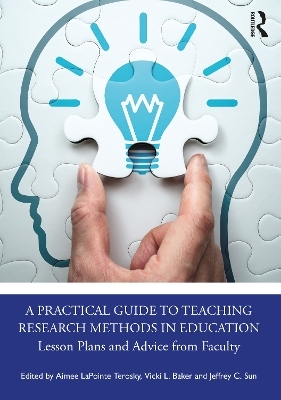
A Practical Guide to Teaching Research Methods in Education
Routledge (Verlag)
978-1-032-18675-7 (ISBN)
Grounded in the wisdom of practice from exemplary and award-winning faculty from diverse institution types, career stages, and demographic backgrounds, this book draws on both the practical and cognitive elements of teaching educational (and related) research to students in higher education today. The book is divided into eight sections, covering the following key elements within education (and related) research: problems and research questions, literature reviews and theoretical frameworks, research design, quantitative methods, qualitative methods, mixed methods, findings and discussions, and special topics, such as student identity development, community and policy engaged research, and research dissemination. Within each section, individual chapters specifically focus on skills and perspectives needed to navigate the complexities of educational research. The concluding chapter reflects on how teachers of research also need to be learners of research, as faculty continuously strive for mastery, identity, and creativity in how they guide our next generation of knowledge producers through the research process.
Undergraduate and graduate professors of education (and related) research courses, dissertation chairs/committee members, faculty development staff members, and graduate students would all benefit from the lessons and expert commentary contained in this book.
Aimee LaPointe Terosky is Professor of Educational Leadership, Director of the Interdisciplinary Doctor of Educational Leadership program, and university liaison to School District of Philadelphia at Saint Joseph's University, USA. Her expertise in K-12 and Higher Education is in teaching/learning, urban principal and faculty careers, and qualitative research. Vicki L. Baker is the E. Maynard Aris Endowed Professor in Economics and Management at Albion College, USA. She currently serves as the faculty director of the Albion College Community Collaborative. Her most recent book is Managing Your Academic Career: A Guide to Re-Envision Mid-Career (Routledge 2022). Jeffrey C. Sun is professor of higher education and law and distinguished university scholar at the University of Louisville. Dr. Sun’s research examines the extent to which policy instruments, other legal actions, and innovative interventions advance or inhibit academic operations through college teaching, learning, and knowledge creation.
Section I: Topics, Problems, and Research Questions; 1. Introduction to Section I: Research Topics, Problems, and Questions 2. From Personal Passion to Hot Topics: Selecting a Topic to Research 3. Articulating a Research Problem and its Rationale: Using Graphical Depictions, Exemplars, and Students’ Own Work 4. Branch out: Using Tree Diagrams to Select and Develop Research Questions; Section II: Literature Review and Theoretical/Conceptual Framework 5. Introduction to Section II: Literature Review and Theoretical/Conceptual Framework 6. Connecting Pieces to the Puzzle: Finding and Maintaining Resources 7. The Candy Sort: Organizing the Literature Review 8. Theoretical and Conceptual Frameworks: Understanding the Role of Theory in Congruent Research Designs; Section III: Research Design 9. Introduction to Section III: Research Design 10. Visualize Your Research Design: Moving from Research Questions to Research Design 11. Let’s Road Trip: Aligning Theoretical Frameworks, Research Questions & Research Design 12. The Self and Research: Positionality through Artifacts 13. Trustworthiness and Ethics in Research: Using Reflexivity to See the Self in Ethical Research; Section IV: Quantitative Methods 14. Introduction to Section IV: Quantitative Methods 15. Making Sense of Multivariate Analysis: Real World Applications 16. Linear regression: A Student-driven Application of Team-based Learning 17. Hands-on Application of Exploratory Factor Analysis in Educational Research 18. Trending Topic: Teaching Difference-in-differences in a Quasi-experimental Methods Course; Section V: Qualitative Methods 19. Introduction to Section V: Qualitative Methods 20. Listening Deeply: Preparing to Facilitate Interviews and Focus Groups 21. Write What You See, Not What You Know: Learning the Method of Observation Through the Visual Arts 22. On the Recovery of Black Life: A Holistic Approach to Document Analysis 23. Emerging Approaches: Ensuring a Pyramid of Congruence when using Critical and Poststructural Theories in Qualitative Educational Research 24. Exploring How Epistemologies Guide the Process of Coding Data and Developing Themes; Section VI: Mixed Methods 25. Introduction to Section VI: Mixed Methods 26. Low Hanging Fruit, Ripe for Inquiry: Considering the Quantitative Dimensions of Mixed Methods Research 27. Creating your Masterpiece: Applying Brush Strokes to Qualitative Exploration of Mixed Methods Research 28. Presenting and Visualizing a Mixed Methods Study; Section VII: Findings and Discussion 29. Introduction to Section VII: Findings and Discussion 30. An Introduction to Regression using Critical Quantitative Thinking 31. Show the Story: Presenting Qualitative Findings 32. Block by Block: Building a Discussion Section 33. Making the Theoretical Practical: Implications for Theory 34. The Donut Memo: Writing for Policymakers and Practitioners; Section VIII: Special Topics 35. Introduction to Section VIII: Special Topics 36. Scholarly Identity Development of Undergraduate Researchers: A Lesson Plan for Professional Development 37. Developing Students’ Cultural Competence through Video Interviews 38. Preparing Students for Community-engaged Scholarship: A Lesson Plan for Collaborative Inquiry Grounded in Awareness of Self and Others 39. Teaching Policy Implications: Can You Have Your Cake and Eat it Too? 40. Introducing Scholars to Public Writing; Closing Words: Helping Students to Learn Research and Become Researchers
| Erscheinungsdatum | 08.03.2023 |
|---|---|
| Zusatzinfo | 5 Tables, black and white; 12 Line drawings, black and white; 12 Illustrations, black and white |
| Verlagsort | London |
| Sprache | englisch |
| Maße | 174 x 246 mm |
| Gewicht | 585 g |
| Themenwelt | Geisteswissenschaften ► Psychologie ► Allgemeine Psychologie |
| Sozialwissenschaften ► Pädagogik ► Allgemeines / Lexika | |
| Sozialwissenschaften ► Pädagogik ► Bildungstheorie | |
| Sozialwissenschaften ► Pädagogik ► Erwachsenenbildung | |
| ISBN-10 | 1-032-18675-5 / 1032186755 |
| ISBN-13 | 978-1-032-18675-7 / 9781032186757 |
| Zustand | Neuware |
| Informationen gemäß Produktsicherheitsverordnung (GPSR) | |
| Haben Sie eine Frage zum Produkt? |
aus dem Bereich


